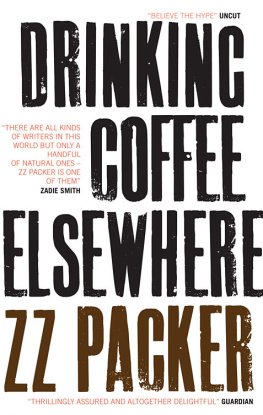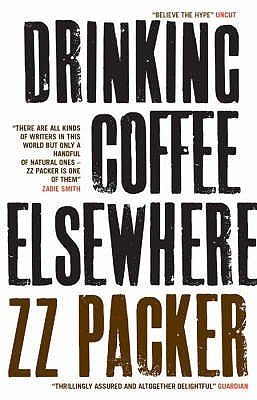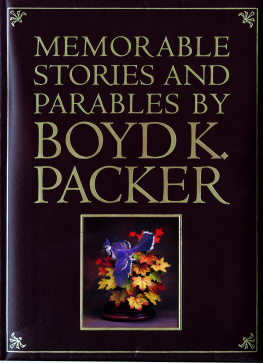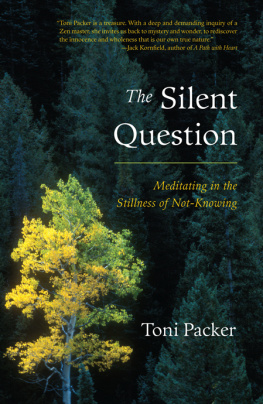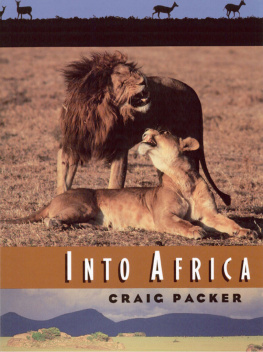ZZ Packer - Drinking Coffee Elsewhere
Here you can read online ZZ Packer - Drinking Coffee Elsewhere full text of the book (entire story) in english for free. Download pdf and epub, get meaning, cover and reviews about this ebook. year: 2009, publisher: Canongate Books Ltd, genre: Art. Description of the work, (preface) as well as reviews are available. Best literature library LitArk.com created for fans of good reading and offers a wide selection of genres:
Romance novel
Science fiction
Adventure
Detective
Science
History
Home and family
Prose
Art
Politics
Computer
Non-fiction
Religion
Business
Children
Humor
Choose a favorite category and find really read worthwhile books. Enjoy immersion in the world of imagination, feel the emotions of the characters or learn something new for yourself, make an fascinating discovery.
Drinking Coffee Elsewhere: summary, description and annotation
We offer to read an annotation, description, summary or preface (depends on what the author of the book "Drinking Coffee Elsewhere" wrote himself). If you haven't found the necessary information about the book — write in the comments, we will try to find it.
Drinking Coffee Elsewhere — read online for free the complete book (whole text) full work
Below is the text of the book, divided by pages. System saving the place of the last page read, allows you to conveniently read the book "Drinking Coffee Elsewhere" online for free, without having to search again every time where you left off. Put a bookmark, and you can go to the page where you finished reading at any time.
Font size:
Interval:
Bookmark:
To my mother,
Rose Northington Packer,
who made a way out of no way

Join me in the hope that this story of our people can help to alleviate the legacies of the fact that preponderantly the histories have been written by the winners.
ALEX HALEY , ROOTS
Elsewhere


B Y OUR SECOND DAY at Camp Crescendo, the girls in my Brownie troop had decided to kick the asses of each and every girl in Brownie Troop 909. Troop 909 was doomed from the first day of camp; they were white girls, their complexions a blend of ice cream: strawberry, vanilla. They turtled out from their bus in pairs, their rolled-up sleeping bags chromatized with Disney characters: Sleeping Beauty, Snow White, Mickey Mouse; or the generic ones cheap parents bought: washed-out rainbows, unicorns, curly-eyelashed frogs. Some clutched Igloo coolers and still others held on to stuffed toys like pacifiers, looking all around them like tourists determined to be dazzled.
Our troop was wending its way past their bus, past the ranger station, past the colorful trail guide drawn like a treasure map, locked behind glass.
Man, did you smell them? Arnetta said, giving the girls a slow once-over, They smell like Chihuahuas. Wet Chihuahuas. Their troop was still at the entrance, and though we had passed them by yards, Arnetta raised her nose in the air and grimaced.
Arnetta said this from the very rear of the line, far away from Mrs. Margolin, who always strung our troop behind her like a brood of obedient ducklings. Mrs. Margolin even looked like a mother duckshe had hair cropped close to a small ball of a head, almost no neck, and huge, miraculous breasts. She wore enormous belts that looked like the kind that weightlifters wear, except hers would be cheap metallic gold or rabbit fur or covered with gigantic fake sunflowers, and often these belts would become nature lessons in and of themselves. See, Mrs. Margolin once said to us, pointing to her belt, this ones made entirely from the feathers of baby pigeons.
The belt layered with feathers was uncanny enough, but I was more disturbed by the realization that I had never actually seen a baby pigeon. I searched weeks for one, in vainscampering after pigeons whenever I was downtown with my father.
But nature lessons were not Mrs. Margolins top priority. She saw the position of troop leader as an evangelical post. Back at the A.M.E. church where our Brownie meetings were held, Mrs. Margolin was especially fond of imparting religious aphorisms by means of acrosticsSatan was the Serpent Always Tempting and Noisome; shed refer to the Bible as Basic Instructions Before Leaving Earth. Whenever she quizzed us on these, expecting to hear the acrostics parroted back to her, only Arnettas correct replies soared over our vague mumblings. Jesus? Mrs. Margolin might ask expectantly, and Arnetta alone would dutifully answer, Jehovahs Example, Saving Us Sinners.
Arnetta always made a point of listening to Mrs. Margolins religious talk and giving her what she wanted to hear. Because of this, Arnetta could have blared through a megaphone that the white girls of Troop 909 were wet Chihuahuas without so much as a blink from Mrs. Margolin. Once, Arnetta killed the troop goldfish by feeding it a french fry covered in ketchup, and when Mrs. Margolin demanded that she explain what had happened, claimed the goldfish had been eyeing her meal for hours, then the fishgiving in to temptationhad leapt up and snatched a whole golden fry from her fingertips.
Serious Chihuahua, Octavia added, and though neither Arnetta nor Octavia could spell Chihuahua, had ever seen a Chihuahua, trisyllabic words had gained a sort of exoticism within our fourth-grade set at Woodrow Wilson Elementary. Arnetta and Octavia would flip through the dictionary, determined to work the vulgar-sounding ones like Djibouti and asinine into conversation.
Caucasian Chihuahuas, Arnetta said.
That did it. The girls in my troop turned elastic: Drema and Elise doubled up on one another like inextricably entwined kites; Octavia slapped her belly; Janice jumped straight up in the air, then did it again, as if to slam-dunk her own head. They could not stop laughing. No one had laughed so hard since a boy named Martez had stuck a pencil in the electric socket and spent the whole day with a strange grin on his face.
Girls, girls, said our parent helper, Mrs. Hedy. Mrs. Hedy was Octavias mother, and she wagged her index finger perfunctorily, like a windshield wiper. Stop it, now. Be good. She said this loud enough to be heard, but lazily, bereft of any feeling or indication that she meant to be obeyed, as though she could say these words again at the exact same pitch if a button somewhere on her were pressed.
But the rest of the girls didnt stop; they only laughed louder. It was the word Caucasian that got them all going. One day at school, about a month before the Brownie camping trip, Arnetta turned to a boy wearing impossibly high-ankled floodwater jeans and said, What are you? Caucasian? The word took off from there, and soon everything was Caucasian. If you ate too fast you ate like a Caucasian, if you ate too slow you ate like a Caucasian. The biggest feat anyone at Woodrow Wilson could do was to jump off the swing in midair, at the highest point in its arc, and if you fell (as I had, more than once) instead of landing on your feet, knees bent Olympic gymnaststyle, Arnetta and Octavia were prepared to comment. Theyd look at each other with the silence of passengers whod narrowly escaped an accident, then nod their heads, whispering with solemn horror, Caucasian.
Even the only white kid in our school, Dennis, got in on the Caucasian act. That time when Martez stuck a pencil in the socket, Dennis had pointed and yelled, That was so Caucasian!
W HEN YOU lived in the south suburbs of Atlanta, it was easy to forget about whites. Whites were like those baby pigeons: real and existing, but rarely seen or thought about. Everyone had been to Richs to go clothes shopping, everyone had seen white girls and their mothers coo-cooing over dresses; everyone had gone to the downtown library and seen white businessmen swish by importantly, wrists flexed in front of them to check the time as though they would change from Clark Kent into Superman at any second. But those images were as fleeting as cards shuffled in a deck, whereas the ten white girls behind usinvaders, Arnetta would later call themwere instantly real and memorable, with their long, shampoo-commercial hair, straight as spaghetti from the box. This alone was reason for envy and hatred. The only black girl most of us had ever seen with hair that long was Octavia, whose hair hung past her butt like a Hawaiian hula dancers. The sight of Octavias mane prompted other girls to listen to her reverentially, as though whatever she had to say would somehow activate their own follicles. For example, when, on the first day of camp, Octavia made as if to speak, and everyone fell silent. Nobody, Octavia said, calls us niggers.
At the end of that first day, when half of our troop made their way back to the cabin after tag-team restroom visits, Arnetta said shed heard one of the Troop 909 girls call Daphne a nigger. The other half of the girls and I were helping Mrs. Margolin clean up the pots and pans from the campfire ravioli dinner. When we made our way to the restrooms to wash up and brush our teeth, we met up with Arnetta midway.
Font size:
Interval:
Bookmark:
Similar books «Drinking Coffee Elsewhere»
Look at similar books to Drinking Coffee Elsewhere. We have selected literature similar in name and meaning in the hope of providing readers with more options to find new, interesting, not yet read works.
Discussion, reviews of the book Drinking Coffee Elsewhere and just readers' own opinions. Leave your comments, write what you think about the work, its meaning or the main characters. Specify what exactly you liked and what you didn't like, and why you think so.

